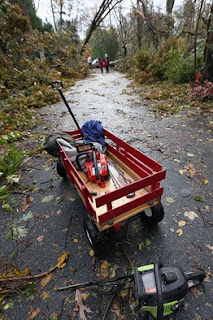November 02, 2012
Post Sandy, Tips for Parents with Anxious Kids
Hurricane Sandy is scary enough for adults—but how do you explain it to a child? And how do you manage your own fear and stress while still being a good parent?
The Juggle asked Fran Walfish, a psychologist and child and family therapist in Beverly Hills, Calif., and author of “The Self-Aware Parent,” for advice. “First, be empathic toward yourself—cut yourself some slack for being frightened and uncertain,” she says. “Encourage your children to express all the feelings they are experiencing. And assure them that the storm is evoking similar feelings in lots of kids.”
Here are more tips from Dr. Walfish:
Take your own emotional temperature: How are you feeling? “Children have laser-sharp radar tuned into their parents and will absorb their emotional state,” says Dr. Walfish. If you are a wreck, then you may not be the best person to comfort your children at the moment. Either calm down or ask your spouse, a friend or a family member to step in and help.
Find out what your kids are thinking. Ask them what they’ve heard, seen on TV, read online. What are they worried about? This is best done with your family as a group, says Dr. Walfish, to show that this is something the family is going through together. And because each child is different, some will need more reassurance.
Stress that the family is together and safe. That’s the most important point children can hear, Dr. Walfish says. And pay attention to your tone of voice: Speak with assurance and calmness. Tell your children that you will get through this, even if it is hard. Use simple language and short, clear facts. Answer all of their questions truthfully. If you don’t know the answer to a question, don’t be afraid to say you don’t know, but will find out and get back to them.
Do your best to keep the kids busy with activities. Set them up with art projects, books, puzzles. Distracting them works wonders, Dr. Walfish says.
Have your children draw pictures of what they saw or are worried will happen. “It expels the powerful feelings out onto paper,” Dr. Walfish says. “This can produce an immediate release of anxiety.” Praise them for talking about their concerns. Encourage the kids to talk about it together. Have them support each other. Telling stories of a trauma is healing and healthy, Dr. Walfish says.
Don’t be afraid to indulge. Make cupcakes. Be lenient on bedtimes. Treat this period like a special event, for both kids and adults, and try to add some good memories to balance the stressful ones.
(Source: blogs.wsj.com)

No comments:
Post a Comment